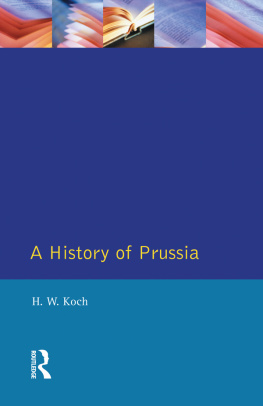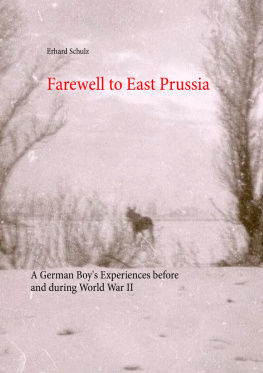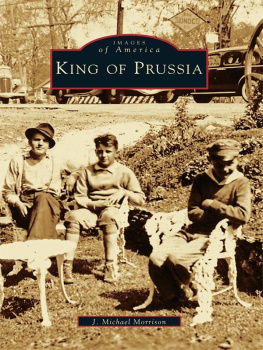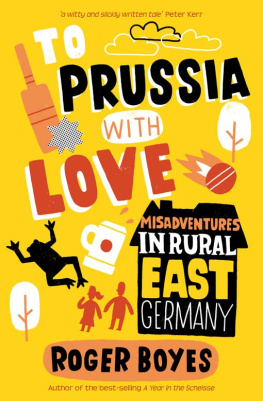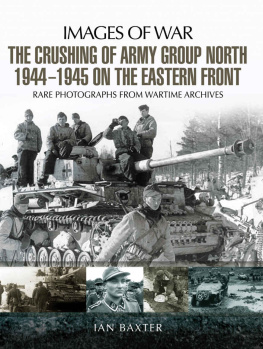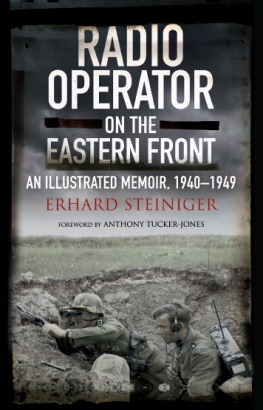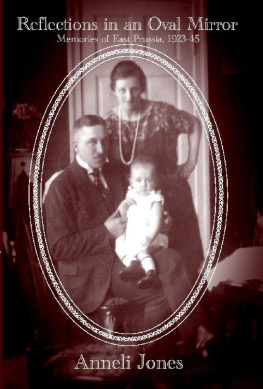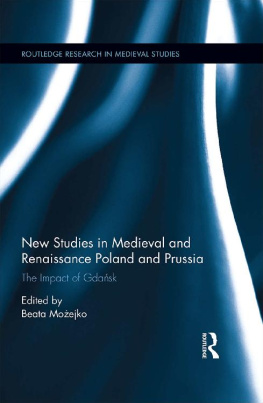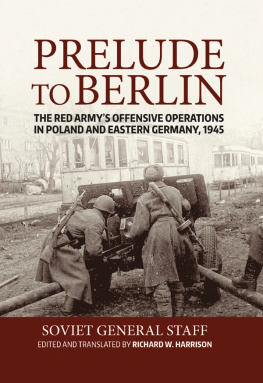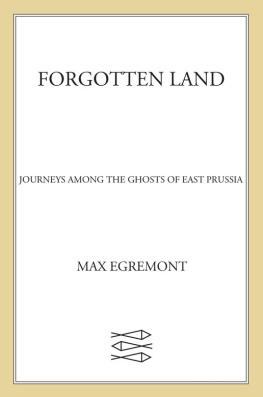THE DEATH OF EAST PRUSSIA
War and Revenge in Germanys Easternmost Province
THE DEATH OF EAST PRUSSIA
War and Revenge in Germanys
Easternmost Province
PETER B. CLARK

Cover design by Liz Trovato
Andover Press and the Andover Press colophon
are registered trademarks of Vantage Press, Inc.
FIRST EDITION
All rights reserved, including the right of
reproduction in whole or in part in any form.
Copyright 2013 by Peter B. Clark
5503 Montgomery Street
Chevy Chase, MD 20815
Published by Andover Press
ISBN: 978-1-481935-75-3
Library of Congress Catalog Card No: 2012936102
0 9 8 7 6 5 4 3 2 1
Excerpts from PRUSSIAN NIGHTS: A POEM by Alexander Solzhenitsyn, translated by Robert Conquest. Translation copyright 1977 by Robert Conquest. Reprinted by permission of Farrar, Straus and Giroux
Wieck, Michael. A CHILDHOOD UNDER HITLER AND STALIN. 2003 by the Board of Regents of the University of Wisconsin System. Reprinted by permission of The University of Wisconsin Press.
To my wife
CONTENTS
ACKNOWLEDGMENTS
W ithout my wife, Heide-Hede Knitzer Clark, this book could not have been written. Her East Prussian background and that of her family provided the motivation for this book. She painstakingly edited each draft of the text and her extremely high standards and insistence on clarity vastly improved the manuscript. Moreover, she made innumerable suggestions regarding the tone and organization of the book that I incorporated in the text. I am most grateful for her sound advice and unstinting support throughout all phases of the creation of The Death of East Prussia.
I wish to acknowledge the generous support and very helpful assistance from other close family members. My daughter, Vanessa J. H. Clark, a keen student of the English language, carefully read the manuscript and made many suggestions of style and substance that significantly improved the text. In addition, I appreciate very much her encouragement to persist with the publication of the book. My son, Barton B. Clark, made many insightful comments on the manuscript, and with his background and knowledge of history, he helped to clarify some of the threads of the narrative. He also provided invaluable assistance and advice regarding the publishing process.
I wish to thank my brother-in-law, Burkhard Knitzer. With a strong interest in German history, he encouraged me from the outset of my research and gave me twenty-five pages of detailed comments and suggestions after reading an entire draft. He corrected a number of errors I had made concerning German history and proposed the inclusion of additional historical detail that fleshed out the exposition. Unfortunately, he did not live to see the published copy that incorporates many of his suggestions.
Early on in my research I had the good fortune to interview Michael Wieck. Growing up in Knigsberg and being half-Jewish, he barely escaped being killed by the Nazis but then nearly perished under the Russian occupation. His memoir, A Childhood under Hitler and Stalin Memoirs of a Certified Jew, is one of my main sources; it describes his incredible struggle to survive under the harsh conditions of post-war Knigsberg. Herr Wieck read the entire manuscript and made a number of suggestions that improved the text. I also thank him for his efforts to have the book published in Germany. While I was researching, writing, and polishing my manuscript, he was a constant source of inspiration and support, and I deeply appreciate his encouragement to persevere in the publication process.
I would like to express my thanks to Lorenz Grimoni, head of the Museum Stadt Knigsberg in Duisburg, Germany. He graciously welcomed my wife, brother-in-law, and me to his office where he shared his extensive knowledge of the demise of Knigsberg. On these visits he gave me several books and other publications of considerable relevance for my research, and he also sent me a number of photographs of Knigsberg for which I am most grateful.
I would also like to thank Michael Rskau for his careful reading of the manuscript and pointing out a number of errors. In addition, I greatly value his gift of a book by his grandfather, Erich Gttgen, Der Wiederaufbau Ostpreussens (The Reconstruction of East Prussia), which describes the reconstruction of East Prussia following the Russian invasion in World War I. I benefited from discussions with Charles McCain, author of An Honorable German, particularly concerning the German Navy in World War II. After he read the manuscript, he provided key references on Operation Hannibal, the evacuation via the Baltic of German civilians and soldiers from East Prussia. He also went out of his way to help me find a literary agent.
Rita Warnock kindly sent me a detailed account of how she survived the end of the war in Stettin under Russian and then Polish occupation, and on her treks east and then finally west, for which I wish to thank her. I would in addition like to mention Iris Rrup, my wifes second cousin. As a young girl she experienced firsthand the Russian occupation of Knigsberg which she described in her book, Also Sprach Vielliebchen, and also conveyed to me in an interview and several conversations. My book, which draws on her vivid accounts and that of many other East Prussians, bears witness to their fate.
While doing research for my book in Germany, I visited the Bundesarchiv in Koblenz and wish to thank Klaus-Dieter Postupa and Barbara Sander for their assistance in locating relevant documents and other material. I am also grateful to Dr. Ernst Gierlich at the Kulturstiftung der deutschen Vertriebenen (Cultural Foundation of German Expellees) in Bonn for a lengthy interview and for providing me with vivid eyewitness accounts of the fate of women in Knigsberg under Russian rule. In the United States most of my research was conducted at the European Reading Room in the Library of Congress in Washington, DC. The staff was unfailingly cordial and helpful in guiding me to the vast collection of material at the Library of Congress related to my topic. I would like to thank in particular Grant Harris, Harold Leich and Predrag Pajic, and especially Regina Frackowiak for her assistance in locating Polish sources and translating a number of passages from Polish into English. While researching at the European Reading Room I met Steve Grant and Chalmers Hood, and I am indebted to them for steering me to some especially relevant references.
Others read all or parts of the manuscript and provided helpful suggestions, including which publishers might be attracted to the topic. These are John Buntin, Prof. Donald Horowitz, Prof. Jerome Stein, and Chris Ward. I would also like to thank Matt Fullerty for implementing some important improvements in the arrangement of the text. Finally, I was most grateful to have Fiona Hallowell as my editor at Andover Press. Her patience and cheer-fullness were very much appreciated. I also wish to thank my copy editor, Grace Morsberger, who significantly helped improve the text, and Richard Rothschild for facilitating the final production.
CONCORDANCE OF PLACE NAMES
T he towns and cities in East Prussia mentioned in the text are referred to by their German names, given that the province was German territory during most the time period covered by the book. They are now in Poland, Russia, and Lithuania, and their contemporary names are provided below following their German names.
German Name | Contemporary Name |


